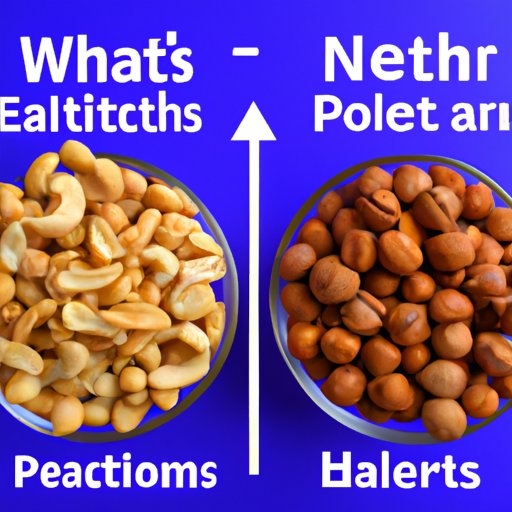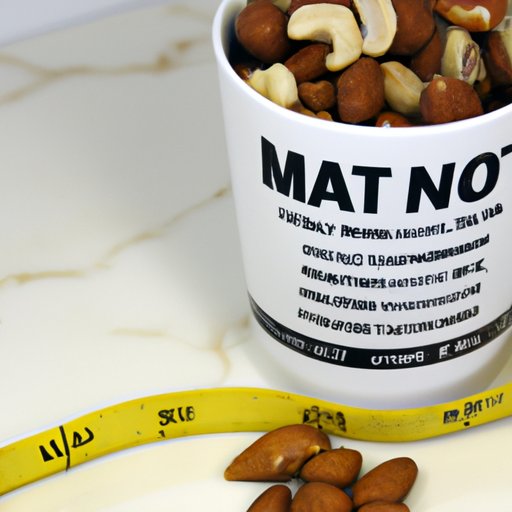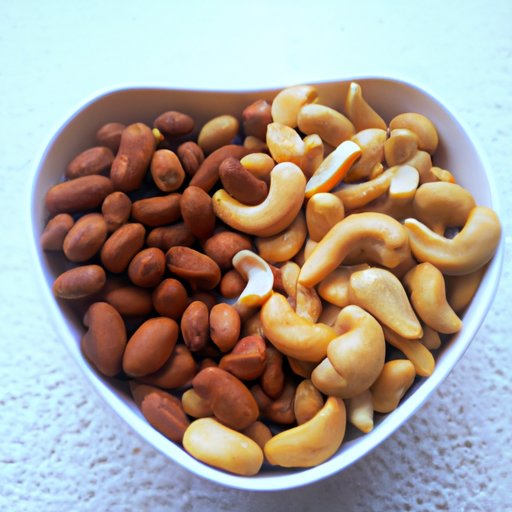Introduction
Snacking is an important part of a balanced diet, and choosing healthy snacks can be beneficial for both physical and mental health. But what makes a snack “healthy”? Generally speaking, a healthy snack should provide a balance of nutrients, including complex carbohydrates, protein, fat, vitamins, and minerals. It should also be free from added sugar, sodium, and other unhealthy ingredients.
Nuts are one of the most popular healthy snacks, and for good reason. They are packed with essential nutrients, have a great taste, and can be eaten in a variety of ways. Let’s take a look at the health benefits of eating nuts as a healthy snack, and how they compare to other popular snacks.

Analyzing the Nutritional Benefits of Eating Nuts
Nuts are a nutrient-dense food, meaning that they are packed with essential vitamins, minerals, and macronutrients. Different types of nuts have different nutritional profiles, but all are excellent sources of essential fatty acids, protein, fiber, vitamins, and minerals. Here’s a look at some of the key nutrients found in nuts.
Different Types of Nuts and Their Health Benefits
There are many different types of nuts, each with its own unique nutritional profile. The most common types of nuts include almonds, walnuts, cashews, pistachios, macadamia nuts, and peanuts. Here’s a quick overview of the key health benefits of each type:
- Almonds – high in vitamin E, magnesium, and potassium; good source of protein and fiber; may lower cholesterol levels.
- Walnuts – high in omega-3 fatty acids; good source of protein and fiber; may improve cognitive function.
- Cashews – high in copper, magnesium, and zinc; good source of protein and fiber; may reduce risk of heart disease.
- Pistachios – high in vitamin B6, magnesium, and phosphorus; good source of protein and fiber; may decrease blood pressure.
- Macadamia nuts – high in monounsaturated fats; good source of protein and fiber; may improve cholesterol levels.
- Peanuts – high in niacin and folate; good source of protein and fiber; may reduce risk of certain cancers.
Nutrient Density of Nuts
Nuts are considered a nutrient-dense food, which means they provide more nutrients than calories. In general, nuts are low in calories but high in essential nutrients. For example, a one-ounce serving of almonds contains only 160 calories but packs 6 grams of protein, 4 grams of fiber, and 13 grams of healthy fats.
Macronutrient Content of Nuts
In addition to their nutrient density, nuts are also a good source of macronutrients. Most nuts contain a balanced combination of protein, carbohydrates, and fat. For example, a one-ounce serving of almonds contains 6 grams of protein, 6 grams of carbohydrates, and 13 grams of fat. This makes them an ideal snack for those looking to maintain a balanced diet.
Vitamin and Mineral Content of Nuts
Nuts are also a great source of vitamins and minerals. Different types of nuts contain different vitamins and minerals, but all are a good source of essential vitamins and minerals. For example, almonds are a good source of vitamin E, magnesium, and potassium; walnuts are a good source of omega-3 fatty acids; and peanuts are a good source of niacin and folate.
Creating Recipes with Nuts to Make Healthy Snacks
Now that we know the nutritional benefits of nuts, let’s take a look at how to make delicious and nutritious snacks using them. Nuts can be used in a variety of recipes, from simple snacks to elaborate meals. Here are some ideas for recipes using nuts as a healthy snack:
- Almond butter and banana toast – Spread almond butter on whole-grain toast and top with sliced bananas for a quick and easy snack.
- Trail mix – Combine your favorite nuts, dried fruit, and seeds for a tasty and nutritious snack.
- Nut-based smoothie – Blend your favorite nuts with Greek yogurt, berries, and spinach for a nutrient-packed smoothie.
- Nut-based granola bar – Mix oats, nuts, and dried fruit for a homemade granola bar.
When making recipes with nuts, it’s important to choose unsalted varieties. Salted nuts are high in sodium, which can increase your risk of hypertension and other health problems.
Tips for Making Delicious and Nutritious Snacks
When making recipes with nuts, there are a few tips to keep in mind:
- Choose unsalted varieties to avoid excess sodium.
- Store nuts in an airtight container in a cool, dry place to preserve their freshness.
- Add spices and herbs to enhance the flavor of your snacks.
- Experiment with different types of nuts to find your favorite flavors.
- Try combining nuts with other healthy ingredients such as fruits, vegetables, and grains.

Comparing the Health Benefits of Nuts to Other Popular Snacks
Now that we know the health benefits of nuts, let’s compare them to other popular snacks. While all snacks can provide some nutritional benefits, some are better than others. Here’s a look at the nutritional profile of some of the most popular snacks:
- Potato chips – high in calories and fat, low in nutrients.
- Chocolate bars – high in sugar and calories, low in nutrients.
- Cookies – high in sugar and calories, low in nutrients.
- Fruit snacks – high in sugar and calories, low in nutrients.
- Candy – high in sugar and calories, low in nutrients.
As you can see, these snacks provide little in terms of nutrition. In contrast, nuts are a nutrient-dense food that provide essential vitamins, minerals, and macronutrients. They are also low in calories and sugar, making them a healthier alternative to other popular snacks.
Pros and Cons of Nuts Compared to Other Popular Snacks
When comparing nuts to other popular snacks, there are both pros and cons. On the plus side, nuts are a nutrient-dense food that provide essential vitamins, minerals, and macronutrients. They are also low in calories and sugar, making them a healthier alternative to other popular snacks. On the downside, nuts can be high in fat and calories, so it’s important to watch portion sizes. Additionally, some people may find them difficult to digest.

Examining How Eating Nuts Can Help with Weight Loss
In addition to their nutritional benefits, eating nuts can also help with weight loss. Nuts are a low-calorie snack that can help you stay full and satisfied between meals. Here’s a look at how eating nuts can help with weight management:
Calories in Nuts
As mentioned earlier, nuts are low in calories compared to other popular snacks. A one-ounce serving of almonds contains only 160 calories, while a one-ounce serving of potato chips contains around 150 calories. This makes nuts an ideal snack for those trying to lose or maintain their weight.
Satiety Value of Nuts
Nuts are also a great source of satiety. Studies have shown that eating nuts can help reduce hunger and cravings, and keep you feeling fuller for longer. This can help reduce the urge to overeat or snack on unhealthy foods.
Role of Nuts in Weight Management
Overall, nuts can be a helpful addition to any weight management plan. They are low in calories but high in nutrients, making them an ideal snack for those trying to lose or maintain their weight. However, it’s important to remember that portion control is still important when it comes to eating nuts, as they can be high in calories if eaten in large quantities.
Conclusion
Eating nuts as a snack can provide many health benefits. Not only are they a nutrient-dense food that provide essential vitamins, minerals, and macronutrients, but they are also low in calories and sugar. Additionally, eating nuts can help reduce hunger and cravings, and can be a helpful addition to any weight management plan. From simple snacks to elaborate meals, there are countless ways to enjoy nuts as a healthy snack.
Summary of Benefits of Eating Nuts as a Healthy Snack
To summarize, eating nuts as a snack can provide many health benefits. They are a nutrient-dense food that provide essential vitamins, minerals, and macronutrients, and are low in calories and sugar. Additionally, they can help reduce hunger and cravings, and can be a helpful addition to any weight management plan. With so many benefits, it’s no wonder why nuts are one of the most popular healthy snacks.
Final Thoughts on Nuts as a Healthy Snack
Eating nuts as a snack can provide many health benefits. They are a nutrient-dense food that provide essential vitamins, minerals, and macronutrients, and are low in calories and sugar. Additionally, they can help reduce hunger and cravings, and can be a helpful addition to any weight management plan. Whether you’re snacking on them plain or adding them to recipes, nuts are a great choice for a healthy snack.
(Note: Is this article not meeting your expectations? Do you have knowledge or insights to share? Unlock new opportunities and expand your reach by joining our authors team. Click Registration to join us and share your expertise with our readers.)
